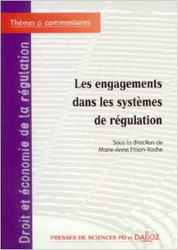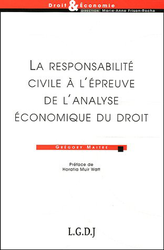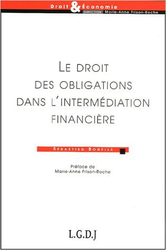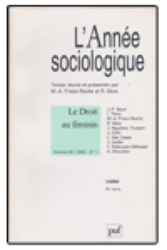Food for thoughts
Sept. 19, 2010
Blog

Sept. 10, 2010
Thesaurus : Doctrine

Référence complète : Picard, E., Pourquoi certaines branches du droit échappent-elles à la summa divisio ?, in BONNET, Baptiste et DEUMIER, Pascale (dir.), De l’intérêt de la summa divisio droit public-droit privé ?, coll. "Thèmes & Commentaires - Actes, Dalloz, Paris, 2010, pp. 66-95
Résumé
Dans une première partie, Etienne Picard critique la conception ordinaire de la summa divisio entre droit public et droit privé.
En effet, il paraît aujourd'hui naturel d'associer des matières à ce qui serait un corpus, constitué par le droit public d'un côté et le droit privé de l'autre. Cette liste de matières mises d'un côté ou de l'autre serait convenue. Dès lors, nous serions dispensé de rechercher "l'essence" du droit public d'une part et du droit privé d'autre part, pour dans un second temps leur rattacher telle et telle matière.
July 16, 2009
Thesaurus : Doctrine
June 10, 2009
Thesaurus : Doctrine
► Référence complète : D. d'Ambra, "Du déclin des codes", in Mélanges en l'honneur du doyen Georges Wiederkehr, De code en code, Dalloz, 2009, pp.147-175.
____
📗Lire une présentation générale des Mélanges dans lesquels l'article a été publié
____
🦉Cet article est accessible en texte intégrale pour les personnes qui suivent les enseignements du professeure Marie-Anne Frison-Roche.
_________
June 24, 2008
Conferences

Référence : Frison-Roche, M.-A., Vision juridique de la crise des subprimes, Caisse des dépôts et consignations, 24 juin 2008.
Le droit a une grande part dans la crise en cascade des subprimes, et non pas tant par absence de droit, qui caractériserait le libéralisme nord-américain, que par excès de droit, les contraintes du crédit immobilier pousser les agents à des comportements déviants.
A cela, se sont ajoutés des incitations perverses liées au droit nord-américain des faillites, qui poussent les particuliers à prendre des risques sans limites, que ce que le droit européen entrave.
Enfin, le marché immobilier nord-américain ne connaît pas l’institution publique du notaire, ce qui expose d’autant plus les personnes et les marchés aux catastrophes.
Oct. 18, 2007
Conferences
June 22, 2007
Conferences
Référence complète : FRISON-ROCHE, Marie-Anne, "Synthèse", in Droit international privé et régulation économique. Perspective du marché intérieur, Université Paris I / Chaire Régulation de Sciences Po, 21 et 22 juin 2007.
Cette conférence a servi d'appui à un article publié en 2008 : La construction du marché intérieur, expérience d'affrontement entre le droit international privé et le droit de la régulation.
June 18, 2007
Conferences
Jan. 11, 2007
Publications

Jan. 27, 2006
Publications

Référence complète : Frison-Roche, M-A., Article introductif de Les engagements dans les systèmes de régulation, série "Droit et Économie de la Régulation", Dalloz-Presses de Sciences po, 2006.
Les engagements sont une notions-clé en droit et en économie, mais les regards sont rarement croisés. Ainsi, les juristes manient depuis toujours la notion de contrat, tandis que les économistes n’intègrent guère la dimension juridique de l’engagement. La première partie de l’ouvrage reprend plutôt les catégories économiques, en s’appuyant sur l’opposition "ex ante/ex post", l’engagement étant du côté du premier, ce qui caractériserait la régulation par rapport à la garde de la concurrence. Les expériences montrent que si d’origine l’ex ante est conçu pour laisser place à l’ex post, on connaît des glissements de l’ex post vers l’ex ante.
June 8, 2005
Publications
April 13, 2005
Editorial responsibilities : Direction de la collection "Droit et Économie", L.G.D.J. - Lextenso éditions (30)

Référence complète : MAITRE, Grégory, La responsabilité civile à l’épreuve de l’analyse économique du droit, préface de MUIR-WATT, Horatia, coll" Droit et Économie" LGDJ, 2005, 315 p.
Il s'agit du 4ième volume de la collection "Droit et Économie".
L'analyse économique du droit a les vertus du droit comparé, dont elle emprunte la méthodologie ; elle permet de mettre en lumière les présupposés du droit auquel elle s'applique et donne une nouvelle vigueur à ses fondements.
Ainsi, les raisonnements économiques appliqués au droit de la responsabilité délictuelle déplacent le débat, qui s'articule traditionnellement autour de la source (faute ou risque), vers la recherche de la meilleure incitation possible à ne pas commettre de dommages ou à les réparer. Les auteurs du droit, qu'ils soient juges ou législateurs, sont alors invités à accorder plus d'importance à la notion de causalité et à articuler davantage les deux principaux régimes de responsabilité, pour faute et sans faute.
L'étude des règles juridiques à partir d'une utilisation systématique des travaux d'analyse économique peut aussi bien conduire à renforcer certains principes traditionnels, telle la réparation intégrale, ou à proposer l'accueil de mécanismes plus contestés, comme la peine privée. L'ouvrage montre encore qu'une pertinence première dort être accordée, notamment par les juges, à des mécanismes comme celui de l'assurance. L'importance de la jurisprudence conduit alors à montrer l'interférence entre les modes de résolution des litiges et les résultats économiques des règles.
Par ces différentes voies, ce livre fournit aux praticiens un autre éclairage sur l'art de bien juger et de bien concevoir les règles, éclairage en rien exclusif, mais éclairage bienvenu.
Lire la quatrième de couverture.
Consulter l'ensemble des ouvrages publiés dans cette Collection
April 6, 2005
Thesaurus : Doctrine
► Référence complète : A.-S. Dupont, Le dommage écologique : le rôle de la responsabilité civile en cas d’atteinte au milieu naturel, Schulthess, Collection genevoise, 2005.
____
__________
March 31, 2005
Publications

Référence complète : Frison-Roche, M-A., Article introductif de Le droit des obligations dans l’intermédiation financière, coll. "Droit et Économie", LGDJ - Lextenson, 2005, p 7-10.
March 9, 2005
Editorial responsibilities : Direction de la collection "Droit et Économie", L.G.D.J. - Lextenso éditions (30)

Référence complète : Bonfils, S., Le droit des obligations dans l’intermédiation financière, préface de Marie-Anne Frison-Roche, coll. "Droit et Économie", LGDJ - Lextenson, 2005, 359 p.
Il s'agit du 1ier ouvrage publié dans la collection "Droit et Économie".
Consulter l'ensemble des ouvrages publiés dans cette Collection.
Jan. 6, 2005
Publications
Nov. 5, 2004
Thesaurus : Doctrine

► Référence complète : A.-S. Dupré-Dallemagne, La force contraignante du rapport d'obligation (Recherche sur la notion d'obligation), préf. Ph. Delebecque, Presses universitaires d'Aix-Marseille, Institut de Droit des Affaires, 2004, 536 p.
____
____
📗lire le sommaire de l'ouvrage
____
📗lire la table des matières de l'ouvrage
____
► Résumé de l'ouvrage (fait par l'éditeur) : "Le rapport d'obligation embrasse de très nombreuses situations. Son champ d'application s'élargit tant par son objet que par les personnes qui en sont tenues. Il présente une nature juridique unique malgré la diversité des sources dont il est issu : qu'il soit de nature contractuelle, quasi-contractuelle, délictuelle ou quasi-délictuelle, le rapport d'obligation oblige son auteur à en exécuter les termes. La force contraignante est inhérente au rapport d'obligation créé. Par conséquent, à défaut d'exécution volontaire, le créancier peut contraindre le débiteur à l'exécution.
La force contraignante, bien qu'inhérente au rapport d'obligation, présente des degrés. Atténuée, elle entraîne une suspension voire une suppression de l'exécution normalement attendue par le créancier. Consolidée, elle octroie au créancier une plus grande garantie d'exécution.".
________
Sept. 30, 2004
Conferences
July 16, 2004
Publications

June 26, 2004
Teachings : Direction de thèses
► Référence complète : Frison-Roche, M.-A., direction de la thèse de Sébastien Bonfils, Le droit des obligations dans l'intermédiation financière, Université Panthéon-Assas (Paris II) , soutenue le 26 juin 2004.
____
► Autres membres du jury :
👤Canivet, G., président,
👤Germain, M., professeur à l'Université Panthéon-Assas (Paris II),
👤Lucas, François-Xavier, professeur d'université,
👤Lévis, M., avocat aux Conseils
____
Au terme de la soutenance, la candidate a obtenu le titre de docteur en droit, avec mention Très honorable avec les félicitations du jury.
Elle a été proposée pour un prix de thèse et une demande de subvention a été faite dans la perspective de publication.
____
La thèse a été par la suite publié dans la 📚collection "Droit & Économie.
____
May 18, 2004
Conferences
April 22, 2004
Publications

Références complètes : FRISON-ROCHE, Marie-Anne, SEVE, René (dir.), Le Droit au féminin, L'Anné Sociologique / PUF, 2004, 296 pages.
Pour accéder à la 4° de couverture, [cliquer ici->http://mafr.fr/IMG/jpg/23_bis.jpg].
Pour accéder au sommaire, [cliquer ici->http://mafr.fr/IMG/pdf/23-_droit_au_feminin_sommaire.pdf].
Pour accéder à la présentation général du thème par Marie-Anne Frison-Roche et René Sève, [cliquer ici->http://mafr.fr/IMG/pdf/23-_droit_au_feminin_presentation.pdf].
March 15, 2004
Conferences
March 10, 2004
Publications
La gouvernance des risques (dir.), Droit & Patrimoine, mars 2004,
March 2, 2004
Conferences